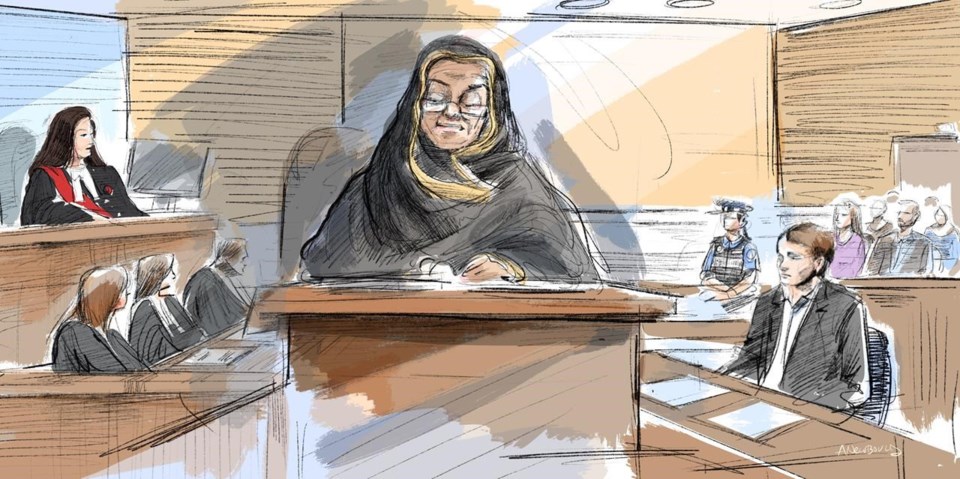LONDON, Ont. — A relative of the London, Ont., family killed in Nathaniel Veltman's truck attack recalled picking up clothes from her grand-niece's bedroom floor a day after the murders and "desperately seeking solace" in her scent for the final time.
Hina Islam's comments were among the emotional victim impact statements delivered at Veltman's sentencing hearing on Thursday.
Veltman was found guilty in November of four counts of first-degree murder and one count of attempted murder for hitting the Afzaal family with his truck while they were out for a walk on June 6, 2021, in London.
Forty-four-year-old Madiha Salman, her 46-year-old husband Salman Afzaal; their 15-year-old daughter, Yumna; and her 74-year-old grandmother, Talat Afzaal, were killed, while the couple's nine-year-old son was seriously hurt but survived.
Veltman, 23, has said he targeted the Afzaals because they were wearing traditional Muslim clothing.
The attack triggered national calls to combat Islamophobia.
Islam, Madiha Salman's aunt, told the sentencing hearing that living in the same neighbourhood as her relatives offered her "a profound sense of grounding and security."
"June 6 took all that away from me," she said, referring to the day of the attack and struggling to contain her tears. "That was the last time I allowed myself to feel safety."
She said the murders had also caused her to lose faith in the notion that "Canada welcomes diversity."
"I feel short sighted for my naivety in believing this promise since this attack. I have lost faith in society," she told the hearing, adding that she was working "very hard to restore that faith."
Islam recounted going to the Afzaal family home on June 7 and entering Yumna's room.
"I picked up her clothes from the ground. I lay on her bed crying and instinctively swaddled my nose in her shirt desperately seeking solace one last time in her lingering scent."
Veltman's trial was heard in Windsor, Ont., but the sentencing proceedings, which will continue on Friday, are taking place in London.
Earlier Thursday, Madiha Salman's mother told the hearing that she fears for her life every time she takes a walk.
Tabinda Bukhari saidthat she was in Pakistan when the attack occurred and frantically tried to figure out what had happened by phone and text message.
She saidshe was "dazed and shocked" that anyone would have targeted her family, calling them "the most loving, friendly and gentle souls."
"It was outrageous," Bukhari told the hearing. "They never harmed anyone. Why would anyone do that to them?"
She said that reminders of her murdered relatives are everywhere and that the circumstances of their deaths haunt her.
"I miss them every second of the day. As I go for a walk I wonder if it would be my last."
Bukhari, who moved from Pakistan to Canada to be with her family following the attack, pledged to ensure that memories of her loved ones will be preserved.
"They are not going anywhere. I will not let them fade away."
Speaking outside the court before the hearing, the chair of the London Council of Imams, Abd Alfatah Twakkal, called for a moment of decisive action to ensure cities are safe havens for people of all backgrounds "for the sake of our common humanity."
Veltman's trial was the first where Canada's terrorism laws were put before a jury in a first-degree murder trial.
Justice Renee Pomerance, who oversaw the trial, instructed the jury they could convict Veltman of first-degree murder if they unanimously agreed prosecutors had established he intended to kill the victims, and planned and deliberated his attack.
She also told the jurors they could reach that same verdict if they found that the killings were terrorist activity.
The terror component isn't a separate charge, and juries don't explain how they reach their verdict, so it's unclear what role – if any – the terror allegations played in their decision.
Pomerance may make findings on that issue as part of the sentencing process.
Prosecutors had argued the attack was an act of terrorism by a self-professed white nationalist while defence lawyers argued Veltman didn't have criminal intent to kill the victims and didn't deliberate and plan the attack.
During the trial, Veltman testified that he was influenced by the writings of a gunman who committed the 2019 mass killings of 51 Muslim worshippers at two mosques in New Zealand.
He also said he had been considering using his pickup truck, which he bought a month earlier, to carry out an attack and looked up information online about what happens when pedestrians get struck by cars at various speeds.
He told the jury that he felt an "urge'' to hit the Afzaal family after seeing them walking on a sidewalk, adding that he knew they were Muslims from the clothes they were wearing and he noticed that the man in the group had a beard.
Jurors had also seen video of Veltman telling a detective that his attack had been motivated by white nationalist beliefs. Court also heard that Veltman wrote a manifesto in the weeks before the attack, describing himself as a white nationalist and peddling unfounded conspiracy theories about Muslims.
This report by The Canadian Press was first published Jan. 4, 2024.
Maan Alhmidi, The Canadian Press




